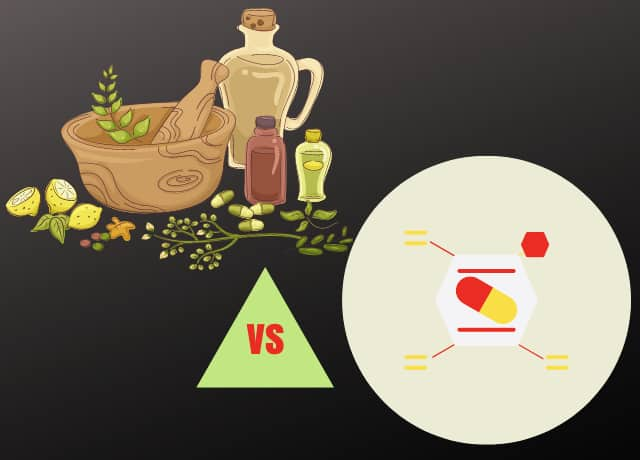Are you considering taking herbal medicine to treat a health condition, but unsure if it can be as effective as pharmaceutical drugs? In this article, we will explore the differences in herbal medicine vs pharmaceutical medicine and the use of each in common health conditions.
There is a growing movement of people who are choosing to ditch conventional medicine over natural remedies. And for good reason. Natural wellness is better for your health than pharmaceutical medication. One reason I feel confident in making this bold statement is this meme that you may have seen on social media.
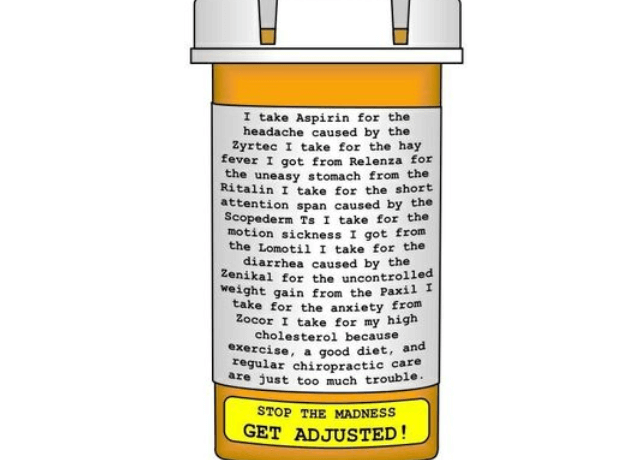
On social media, that may get a few laughs, but in the real world, that is an all too common scenario.
What Are the Benefits of Herbal Medicine?
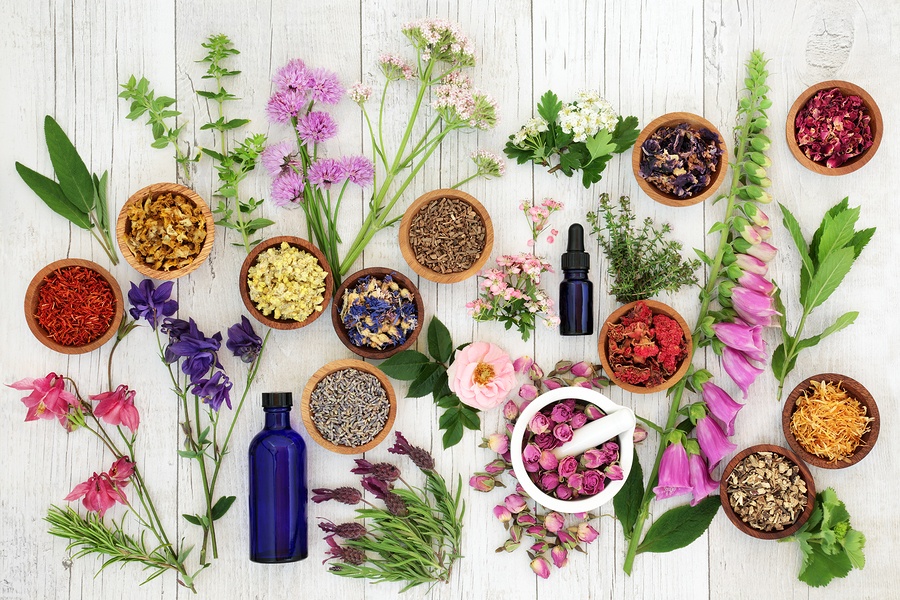
Herbal medicine has been used for centuries as a way to promote wellness and manage a variety of medical conditions. This ancient practice has seen something of a resurgence in recent years thanks to its many potential benefits.
Herbal medicine also offers many advantages compared to traditional pharmaceuticals, such as fewer side effects from herbal formulas and the ability to customize herbal treatments for individual needs. Additionally, herbal medicines often have fewer long-term risks than pharmaceuticals since they provide more holistic treatment options rather than targeting just one area or symptom.
As such, herbal medicines can be an important part of any health plan that emphasizes well-being and preventative care.
Natural Herbal Medicine VS Pharmaceutical Medicine
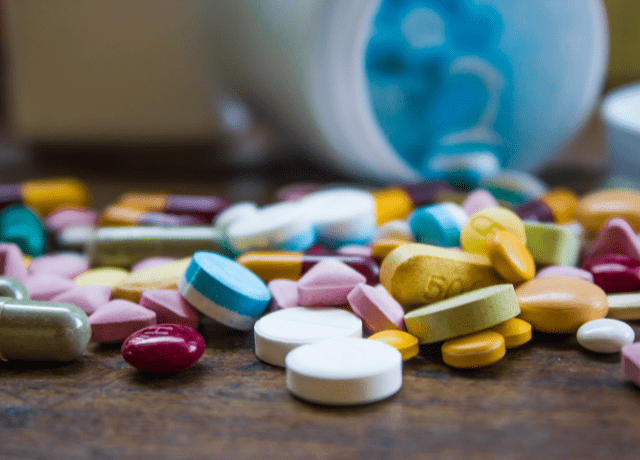
Pharmaceuticals have become the go-to treatment for almost every imaginable ailment. And while they may offer a quick fix, they often come with a host of undesirable side effects.
In contrast, natural remedies are gentle on the body and can be safely used to treat a wide variety of conditions.
In fairness, the use of pharmaceuticals can save your life. But they also can mask symptoms, cause nasty side effects, and worsen your health.
Ironically, many medicines are developed and produced from herbs, plants, fungi, and so on. As a result, we've shifted our focus away from actual food and toward medicines. We've lost our connection to nature and how powerful food and lifestyle can be.
Everything your body takes in is a collection of particles called molecules, whether it's food or medicine. Those molecules are broken down by your body into smaller pieces called atoms. These atoms are then reorganized and grouped together to make new molecules and compounds that have many important functions in the body. These functions include energy, growth, and repair, along with being necessary for millions of tiny chemical reactions that keep us working like a well-oiled engine.
How Pharmaceuticals Work
When you take a medication, it is broken down by your digestive system into its constituent atoms. These atoms work by attaching themselves to specific molecules in your cells and change their function.
For instance, blocking pain messages along nerve cells (1). This is the reason drugs can have such serious side effects. They're interacting with the molecules in your cells that are responsible for vital bodily functions.
Pain is there for a reason! It tells you something is wrong! Doesn't it make sense to address the cause of the pain rather than mask the symptoms?
Are Doctors Against Herbal Medicine?
When it comes to whether doctors are against herbal medicines, the answer is complex. It's important to understand that some medical practitioners may be quite skeptical of their effectiveness. Others may be more open to the idea.
Ultimately, each doctor must come to a decision on this based on their own experience, level of training and education, and personal viewpoint. Some can find value in certain herbs to supplement traditional treatments while others may feel that they should stick with standard practices.
Herbal medicines often have fewer long-term risks than pharmaceuticals since they provide more holistic treatment options rather than targeting just one area or symptom.
Herbal medicines provide an opportunity for you to take a greater control over your personal health care and emphasize preventative care.
Food As Medicine
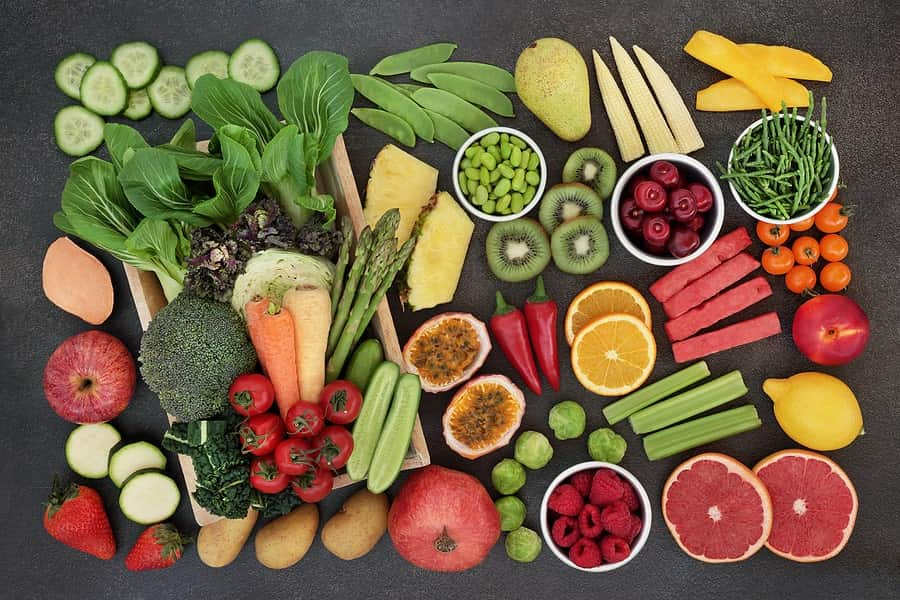
Food is often eaten in large amounts, whereas medicine is consumed in tiny amounts (micrograms). Those micrograms can have a big impact, but the sheer volume of molecules we consume through our food has a massive impact that no medicine can truly match.
The importance of food cannot be overstated. There are multiple ways that your diet can help you to stay healthy. Whether your diet is vegan, paleo, keto, vegetarian, or carnivore, the food you eat can kill your cure you. Literally!
Cavemen didn't have pharmaceuticals. They ate fresh food, and their lifestyle naturally involved plenty of exercise. If that didn't work, we wouldn't be here now. The human race would have gone extinct. Cavemen died of being caught by Saber tooth tigers, not of diabetes, cancer and heart disease.
Nutritious Food is Vital for Good Health and Well-being
Food can prevent disease in the first place. And there are many foods that can be used to treat a wide variety of conditions, without the risk of harmful side effects.
The definition of food is “any nutritious substance that people or animals eat or drink or that plants absorb to maintain life and growth.” Note the word “nutritious” and the phrase “maintain life”! I'll just let you think about that for a bit.
Spices and Herbs Used For Centuries
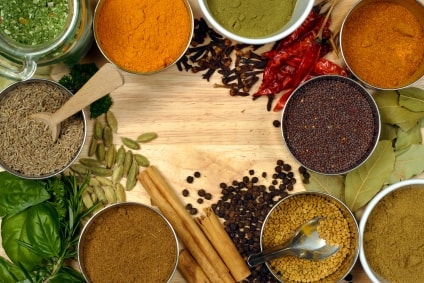
Conventional medications can be harsh on your system, but natural remedies are much gentler. This is because they work with your body's own systems to restore balance, rather than overriding them. They are also effective.
Natural remedies have been used for centuries to treat all sorts of conditions both minor and serious. Spices like turmeric (curcumin), garlic and ginger are particularly effective.
Ginger
Ginger has been shown to reduce the risk of developing diabetes (3) reduce indigestion (4), ease menstrual cramps (5), and reduce morning sickness (6).
There is also some proof that gingerol plays a part in slowing down the development of colorectal cancer by blocking chemicals that cause it (7). It also shows anti-cancer abilities for pancreatic cancer (8) and cancer of the digestive system (9). Even better news is that there are no nasty side effects and ginger is cheap to buy.
Curcumin
The active ingredient in turmeric is curcumin, and it has been credited with protecting the brain in a way that reduces depression 110) and dementia (11).
Curcumin also protects against heart problems (12). Truth be told, as curcumin is not used very easily by the body, proessed forms of curcumin are the best way to benefit from it.
These spices work to interrupt the way inflammation develops in the body, in one way or another (13).
Big Pharma = Big Money
Big Pharma is BIG business. In fact, five hundred and thirty five billion dollars were spent on prescribed medication in 2018. And that was just in America before the pandemic! (14)
So it would appear that Big Pharma is more interested in profit than helping people get better, both in America (15) and the United Kingdom (16). Disease keeps Big Pharma in business!
So much so that some clinicians have been sued for promoting the use of natural remedies. Tullio Simoncini was even imprisoned for treating cancer patients with bicarbonate of soda. This was based on his belief that cancer is caused by a fungus, which was later shown to be untrue (17). However, there IS research that shows he was on to something.
Herbal Medicine VS Pharmaceutical Medicine Treatment Examples
Cancer
Cancer is a very sensitive subject because it is life-threatening. Yet, the ‘cures' are surgery, and very expensive, invasive treatments like radiotherapy and chemotherapy.
These treatments “kill” cancer cells, but they also destroy perfectly healthy cells. Not only that, but there are also other side effects such as nerve damage, nausea, vomiting, hair loss, extreme fatigue and many others (19).
These treatments may extend life expectancy, but the cancer patient is in so much pain and so weak that it's not a pleasant way to live or end your days. For that reason, may patients turn to other natural options.
Anti-Cancer Natural Natural Remedies and Diet
Those options include natural remedies and healthy diets. A man with kidney cancer has managed to keep it at bay by following a vegan diet. His wife also credits this diet with reducing the number of times she has had skin cancer (20).
Big Pharma will dismiss this as anecdotal evidence. Or say it is due to the fact, in some cases, the body can spontaneously heal. Yet there is scientific evidence that the herb moringa can kill breast cancer and colon cancer (21).
Curcumin
There is a huge amount of evidence backing up the anti-cancer effects of curcumin on many types of cancer. It is also considered safe with no side effects (22). A quick search on Pubmed for “curcumin and cancer prevention” will yield 19 thousand results! “Curcumin cancer treatment” gives a whopping 40 thousand results; seven thousand in the last year.
You can not patent an herb or vegetable. Big Pharma has been quick to jump on the bandwagon of the effectiveness of curcumin as cancer treatment (23). It takes these natural remedies and develops them into many conventional medications (24). They do this because they can then patent the drug and make money from it. For this exact reason, medications have been developed to mimic the anti-cancer action of herbs and plants (25).
Prevention is Better Than Cure
One of the main ways to ‘treat' cancer (and many other diseases) is to prevent it happening in the first place. The Academy of Nutrition and Dietetics strongly recommends a healthy diet to reduce the risk of developing cancer (26).
Type 2 Diabetes
It's no secret that Type 2 diabetes is a big problem in the world today. According to the World Health Organization, over 422 million people around the world have diabetes, and that number is expected to grow in the years ahead.
Often, T2 diabetes is caused in the first place by poor diet and lack of exercise (27). Disclaimer: Some cases are linked to genetics, ethnicity, and age. T2 diabetes is completely different from T1 diabetes, which is not caused by lifesytle and for which there is no known cure (28).
How is Type 2 Diabetes Treated?
So how is T2 diabetes treated? There are a few different options.
One option is to treat it with medication prescribed by Big Pharma. This approach typically involves taking prescription drugs such as insulin or metformin on a regular basis. One downside to this approach is that it is expensive. Metformin can also cause side effects such as nausea, stomach pain and diarrhea (29).
Type 2 diabetes is caused by the body becoming insulin resistant.
In simple terms, the body gets used to it and so doesn't do what it is supposed to do when insulin is present.
Quick Biochemistry Lesson
When we eat, food is broken down into glucose, which causes blood sugar levels to increase. Insulin is released, which is the signal for cells to allow glucose in, to use for energy. Unfortunately, with diabetes, the cells become insulin resistant and no longer allow glucose to enter.
Insulin handles getting sugar out of the blood to return levels to default, or homeostasis. If the cells won't allow the glucose to enter, the surplus energy gets stored; first as glycogen in the liver and muscles, then as fat. This leads to weight gain and obesity.
Yet, cells haven't taken in any energy (which they need to work), so they send out a message that they need more energy. In other words, food! So the hunger signal is sent to the brain, which sends us running to the cookie jar.
The ridiculous thing is that Big Pharma prescribes more insulin to ‘cure' diabetes. More insulin won't do any good. The cells aren't listening to the message from insulin. They're insulin-resistant. Treating diabetes with insulin is treating the symptoms, not the cause.
A Natural Way to Treat Insulin-Resistance
A natural way to treat insulin-resistance very effectively and completely for free is fasting (31). In other words, not eating for 12 to 16 hours a day.
Alternatively, a healthy diet low in sugar and carbohydrates, such as the ketogenic diet, is effective at reducing insulin resistance (32).
Both of these methods have been proved to reverse diabetes. Neither cost very much, if anything. If you treat diabetes the way Big Pharma wants you to, you will never cure it. You just have to live with it. Worse still, the long-term consequences are kidney disease, heart disease, blindness, neuropathy, amputation and eventually premature death (33).
Multiple Sclerosis
Dr. Terry Wahls was a physically healthy and athletic young woman. Yet, by the time she was 48 years old, she was diagnosed with MS, a condition that can interfere with brain-muscle communication.
With limited core strength and virtually no use of her arms, she was confined to a tilt-recline wheelchair. Big Pharma couldn't help. She was condemned to a life in a wheelchair.
But Dr. Wahls wasn't prepared to give up without a fight! After months of searching for a ‘cure,' she stumbled across a scientific article suggesting that MS may be caused by mitochondria that aren't operating properly (34).
Mitochondria are small, energy converters in most of our cells, often referred to as the “power plants” of our cells. As a by-product of generating energy, small chemicals called free radicals re produced. The mitochondria can be damaged if there are too many of them in the cell (35).
Fruits and vegetables are rich in antioxidants (36), which are considered to remove this poisonous sludge before it has a chance to do harm. Dr. Wahls realized that food, not drugs and medication, could be her answer to feeling better.
Long Story Short
Terry changed her diet. She began eating 12 servings of fruit and vegetables a day, along with healthy fats, grass-fed beef and oily fish that contain omega-3 fatty acids.
She went fro a reclining wheelchair to an upright electric scooter in just four mounts with the aid of an electrical stimulation device, which physical therapists use to help rebuild atrophied muscles.
A year later, she was able to ride a bike again!
Since then, Dr. Wahls has established the Wahls Protocol and is helping her patients overcome auto-immune illness via diet (37). Not with pills and meds.
CBD Is a Powerful Natural Remedy
Unfortunately, side effects are what the general public has come to accept as a necessary evil of taking medication. It is scary to find out that up to a third of drugs approved as safe by the FDA (the governing body that everyone relies on for reassurance) are actually unsafe (38).
The FDA does not approve CBD (39). Despite this, many people use CBD for its many health benefits and specifically to ease pain. CBD oil, or cannabidiol, is a non-psychoactive, which means it won't give you a “high”, unlike other compounds in cannabis (40).
Our bodies can produce chemicals called endo-cannabinoids that can attach to specific receptors in our nervous system. This means we have the ability to use CBD to reduce pain and inflammation (41). CBD oils have been shown to help ease the pain associated with multiple sclerosis and diabetic neuropathy (42).
Although CBD doesn't affect your mood by giving you a “high,” studies have found that it can improve anxiety (43). The bets bit is that CBD has much less risk of side effects than anti-depressants (44).
Rewriting the Meme Using Natural Remedies
Having mentioned it at the beginning of this Herbal Medicine VS Pharmaceutical Medicine article, let's return to the meme about side effects.

Let's rewrite it using natural remedies.
Unfortunately, it doesn't make for such amusing reading.
Most days, I eat five portions of fruits and vegetables. I usually eat them raw or steamed, as that is the best way to preserve the nutrients (53).
I also enjoy oily fish at least once a week. This keeps me healthy because my immune system is getting all the vitamins and minerals it needs to keep me in top form (53). I take the stairs instead of the elevator and walk a mile each day.
I got a bit of a headache one day, so I drank a pint of water. That seemed to ease things (55). Now I drink five pints of water a day. That keeps my bowels working properly, so I rarely get constipation or diarrhea (56). The vegetables help keep me ‘regular' too, but if I do get a bout of constipation, I nibble on some prunes. It soon gets sorted (57).
Because I am a healthy weight, exercise regularly, sleep well, don't smoke and have low anxiety levels. I have, thankfully, never suffered from erectile dysfunction (58).
Like most people, I enjoy the odd glass of red wine. But I was pleased to find out that drinking alcohol moderation also helps to protect me from the embarrassment of not performing in bed (59). Having said that, just to be on the safe side, I always add beet juice to my daily smoothie because beetroot has nitrates in it. These help keep blood vessels dilated (60).
All the vegetables I eat help keep my gut healthy too. Apparently, they also feed the good bacteria in my gut (61). I find that, along with the omega 3's in the oily fish I eat, (62) I keep anxiety at bay (63).
I do have the odd ‘off day' when life gets to me. I usually go and relax in a lovely warm bath that I have dissolved magnesium salts in.
I put on a meditation (there are loads on YouTube) and I always feel better afterwards. This is because meditation relaxes the nervous system (64). Meditation is very calming and great for reducing anxiety too! (65).
Like everyone else, if I am worried about something, my sleep can suffer. I recently discovered a weird-named herb called Ashwagandha that apparently works wonders to improve mental health, concentration and sleep (66). This is a natural remedy I will definitely be including in my daily routine in the future.
One thing I am not concerned about is my weight. Alongside my healthy diet, I only eat within an 8 hour window. For 16 hours, I don't eat – but it's not a problem as I'm usually asleep for at least half of that time. This is called intermittent fasting and is a great way to maintain your weight (67).
My cholesterol levels are normal and I credit my diet and the amount of ginger I eat for that (68). Disclaimer: high cholesterol can be genetic and not cause by diet (69).
I am not invincible, and sometimes bacteria or viruses can cause me to feel ill. My go to remedy is not antibiotics, which often don't work due to antibiotic resistance (70) and kill off the good bacteria that are fighting the good fight in my gut (71). I make sure I take a high-strength garlic tablet, as allicin in garlic is known to ease bacterial and viral illnesses (72).
In the interest of fairness, you should not take garlic if you take aspirin or warfarin. These are blood-thinning agents, and garlic can interact with them (73).
I'm getting on a bit now, so I do tend to have some age-related aches and pains. Unfortunately, age is a major risk factor for developing diseases (75). However, I have found that CBD and ginger ease pain. This is because it contains gingerol, which has anti-inflammatory properties (76).
Herbal Medicine VS Pharmaceutical Medicine – Conclusion
There are many, many more ways that natural remedies can keep us fit and well.
Maintaining natural wellness is not as cut and dried as eating healthily and doing regular exercise. Genetics and other risk factors do play a part. In that case, seek the opinion of your medical practitioner.
Medication does have a part of play. Just make sure you do your due diligence. Remember, it won't hurt to follow a good diet and take regular exercise as a back-up for your health insurance.
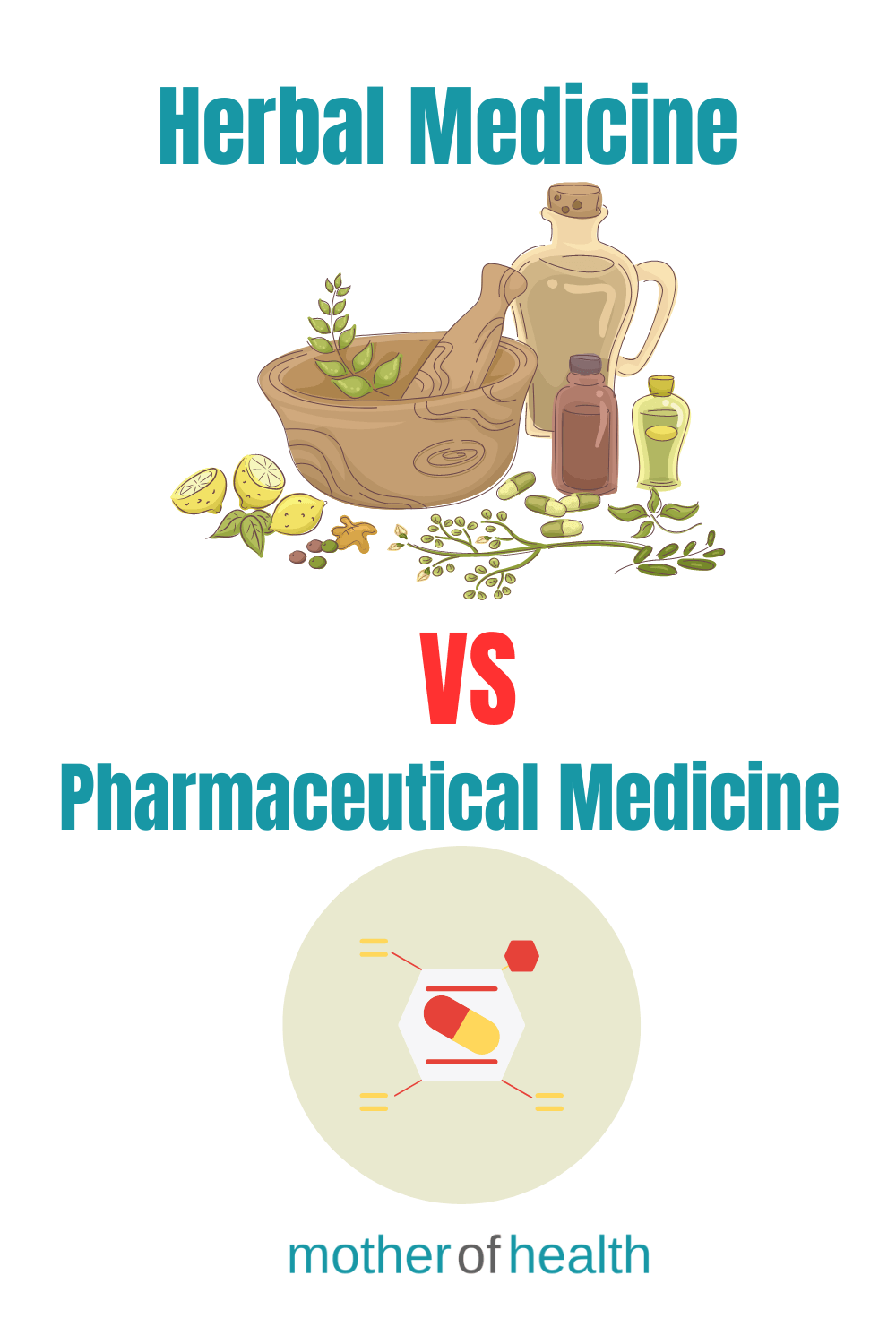
References
- Painkillers https://patient.info/treatment-medication/painkillers.
- 7 of the World’s Deadliest Plants https://www.britannica.com/list/7-of-the-worlds-deadliest-plants
- Effects of Ginger on Fasting Blood Sugar, Hemoglobin A1c, Apolipoprotein B, Apolipoprotein A-I and Malondialdehyde in Type 2 Diabetic Patients https://www.ncbi.nlm.nih.gov/pmc/articles/PMC4277626/
- Effects of ginger on gastric emptying and motility in healthy humans https://pubmed.ncbi.nlm.nih.gov/18403946/
- Efficacy of Oral Ginger (Zingiber officinale) for Dysmenorrhea: A Systematic Review and Meta-Analysis https://www.ncbi.nlm.nih.gov/pmc/articles/PMC4871956/
- Effects of ginger for nausea and vomiting in early pregnancy: a meta-analysis https://pubmed.ncbi.nlm.nih.gov/24390893/
- Phase II Study of the Effects of Ginger Root Extract on Eicosanoids in Colon Mucosa in People at Normal Risk for Colorectal Cancer https://aacrjournals.org/cancerpreventionresearch/article/4/11/1929/49758/ Phase-II-Study-of-the-Effects-of-Ginger-Root
- Anticancer Effect of Ginger Extract against Pancreatic Cancer Cells Mainly through Reactive Oxygen Species-Mediated Autotic Cell Death https://www.ncbi.nlm.nih.gov/pmc/articles/PMC4427290/
- Ginger and Its Constituents: Role in Prevention and Treatment of Gastrointestinal Cancer https://www.ncbi.nlm.nih.gov/pmc/articles/PMC4369959/
- Lower brain-derived neurotrophic factor levels are associated with age-related memory impairment in community-dwelling older adults: the Sefuri study https://www.nature.com/articles/s41598-020-73576-1
- Decreased Serum Brain-Derived Neurotrophic Factor (BDNF) Levels in Patients with Alzheimer’s Disease (AD): A Systematic Review and Meta-Analysis https://www.ncbi.nlm.nih.gov/pmc/articles/PMC6358753/
- Curcumin as a potential protective compound against cardiac diseases https://pubmed.ncbi.nlm.nih.gov/28274852/
- Suppression of the nuclear factor-kappaB activation pathway by spice-derived phytochemicals: reasoning for seasoning http://www.curcumin.co.nz/pdf/Suppression_Of_Nuclear_Factor_Kb.pdf
- How Big Pharma Reaps Profits While Hurting Everyday Americans https://www.americanprogress.org/article/big-pharma-reaps-profits-hurting-everyday-americans/
- Wyden-Grassley Sovaldi Investigation Finds Revenue-Driven Pricing Strategy Behind $84,000 Hepatitis Drug https://www.finance.senate.gov/ranking-members-news/wyden-grassley-sovaldi-investigation-finds-revenue-driven-pricing-strategy-behind-84-000-hepatitis-drug.
- The influence of big pharma https://www.ncbi.nlm.nih.gov/pmc/articles/PMC556141/
- Debunking the ‘Cancer Is a Fungus’ Myth https://www.healthline.com/health/is-cancer-a-fungus
- Does Baking Soda Function as a Magic Bullet for Patients With Cancer? https://www.ncbi.nlm.nih.gov/pmc/articles/PMC7249593/
- Side effects of lymphoma treatment https://lymphoma-action.org.uk/about-lymphoma/side-effects-lymphoma-treatment?gclid=CjwKCAiAjoeRBhAJEiwAYY3nDJlo2h06U1hZE_jP7Mi8MzbXwyh6CAh_fiS5HW4f8rQrAMeAodnUQhoCPB4QAvD_BwE
- Couple heals kidney cancer and myasthenia gravis with a plant-based diet https://www.chrisbeatcancer.com/couple-heals-kidney-cancer-and-myasthenia-gravis-with-a-plant-based-diet/
- Isolation of biologically active constituents from Moringa peregrina (Forssk.) Fiori. (family: Moringaceae) growing in Egypt https://pubmed.ncbi.nlm.nih.gov/21716619/
- Efficacy and safety of curcumin in combination with paclitaxel in patients with advanced, metastatic breast cancer: A comparative, randomized, double-blind, placebo-controlled clinical trial https://pubmed.ncbi.nlm.nih.gov/32335356/
- Novel curcumin mimics: Potential anticancer drugs against human glioblastoma multiforme https://www.annalsofoncology.org/article/S0923-7534(20)35254-6/pdf
- Major Compound Curcumin on Health: Bioactive Effects and Safety Profiles for Food, Pharmaceutical, Biotechnological and Medicinal Applications https://www.frontiersin.org/articles/10.3389/fphar.2020.01021/full#f2
- Plants Against Cancer: A Review on Natural Phytochemicals in Preventing and Treating Cancers and Their Druggability https://www.ncbi.nlm.nih.gov/pmc/articles/PMC4017674/
- Position of the Academy of Nutrition and Dietetics: Vegetarian Diets https://www.jandonline.org/article/S2212-2672%2812%2901993-4/pdf
- Effect of diet on type 2 diabetes mellitus: A review https://www.ncbi.nlm.nih.gov/pmc/articles/PMC5426415/
- Type 1 diabetes https://www.diabetes.org.uk/diabetes-the-basics/types-of-diabetes/type-1
- Type 2 diabetes https://www.mayoclinic.org/diseases-conditions/type-2-diabetes/diagnosis-treatment/drc-20351199
- How Insulin Works https://www.webmd.com/diabetes/insulin-explained
- Intermittent fasting: is there a role in the treatment of diabetes? A review of the literature and guide for primary care physicians https://clindiabetesendo.biomedcentral.com/articles/10.1186/s40842-020-00116-1
- Effect of the ketogenic diet on glycemic control, insulin resistance, and lipid metabolism in patients with T2DM: a systematic review and meta-analysis https://www.ncbi.nlm.nih.gov/pmc/articles/PMC7705738/
- Complications of diabetes https://www.diabetes.org.uk/guide-to-diabetes/complications
- Is multiple sclerosis a mitochondrial disease? https://www.ncbi.nlm.nih.gov/pmc/articles/PMC2790545/
- The mitochondrial free radical theory of aging: a critical view https://pubmed.ncbi.nlm.nih.gov/20021368/
- The total antioxidant content of more than 3100 foods, beverages, spices, herbs and supplements used worldwide https://www.ncbi.nlm.nih.gov/pmc/articles/PMC2841576/
- Who is Dr Terry Wahls https://terrywahls.com/about/about-terry-wahls/
- Postmarket Safety Events Among Novel Therapeutics Approved by the US Food and Drug Administration Between 2001 and 2010 https://jamanetwork.com/journals/jama/fullarticle/2625319
- FDA Warns Companies Illegally Selling Over-the-Counter CBD Products for Pain Relief https://www.fda.gov/news-events/press-announcements/fda-warns-companies-illegally-selling-over-counter-cbd-products-pain-relief
- Cannabis https://www.ncbi.nlm.nih.gov/books/NBK425762/
- Pharmacotherapeutic considerations for use of cannabinoids to relieve pain in patients with malignant diseases https://www.ncbi.nlm.nih.gov/pmc/articles/PMC5922297/
- A Review of Scientific Evidence for THC:CBD Oromucosal Spray (Nabiximols) in the Management of Chronic Pain https://www.ncbi.nlm.nih.gov/pmc/articles/PMC7027889/
- Cannabidiol: A Potential New Alternative for the Treatment of Anxiety, Depression, and Psychotic Disorders https://www.ncbi.nlm.nih.gov/pmc/articles/PMC7699613/
- The effects of cannabidiol (CBD) on cognition and symptoms in outpatients with chronic schizophrenia a randomized placebo controlled trial https://pubmed.ncbi.nlm.nih.gov/29619533/
- Does Acid Reflux Cause Headaches? https://www.healthline.com/health/gerd/gerd-headaches
- Viagra Side Effects and Other Impacts on the Body https://www.healthline.com/health/mens-health/effects-of-viagra-on-the-body
- Finasteride and sexual side effects https://www.ncbi.nlm.nih.gov/pmc/articles/PMC3481923/
- Is hair loss a side effect of Adderall? https://www.medicalnewstoday.com/articles/325387
- 20 Causes for Nausea and Diarrhea https://www.healthline.com/health/nausea-and-diarrhea
- [Pharmacy-clinics medication of the month. Orlistat (xenical)]https://pubmed.ncbi.nlm.nih.gov/10321111/
- Fat Pharms: Antidepressants and Weight Gain https://www.webmd.com/depression/features/antidepressants-weight-gain
- Mood, Personality, and Behavior Changes During Treatment with Statins: A Case Series https://www.ncbi.nlm.nih.gov/pmc/articles/PMC5005588/
- Effects of different cooking methods on health-promoting compounds of broccoli https://www.ncbi.nlm.nih.gov/pmc/articles/PMC2722699/
- Foods that fight inflammation https://www.health.harvard.edu/staying-healthy/foods-that-fight-inflammation
- Dehydration Headache https://my.clevelandclinic.org/health/diseases/21517-dehydration-headache
- How Drinking Fluids Can Help You Manage Constipation https://www.webmd.com/digestive-disorders/water-a-fluid-way-to-manage-constipation
- Systematic review: the effect of prunes on gastrointestinal function https://pubmed.ncbi.nlm.nih.gov/25109788/
- 9 Natural Treatments for Erectile Dysfunction https://www.healthline.com/health/erectile-dysfunction/ed-natural-treatments
- Alcohol intake and risk of erectile dysfunction: a dose–response meta-analysis of observational studies https://www.nature.com/articles/s41443-018-0022-x
- The Potential Benefits of Red Beetroot Supplementation in Health and Disease https://www.ncbi.nlm.nih.gov/pmc/articles/PMC4425174/
- What prebiotic foods should people eat? https://www.medicalnewstoday.com/articles/323214
- Omega 3 fatty acids in bipolar disorder: a preliminary double-blind, placebo-controlled trial https://pubmed.ncbi.nlm.nih.gov/10232294/
- Exploring the Role and Potential of Probiotics in the Field of Mental Health: Major Depressive Disorder https://www.ncbi.nlm.nih.gov/pmc/articles/PMC8161395/
- Rapid recovery from major depression using magnesium treatment https://pubmed.ncbi.nlm.nih.gov/16542786/
- Neural correlates of mindfulness meditation-related anxiety relief https://academic.oup.com/scan/article/9/6/751/1664700?login=false
- Efficacy and Safety of Ashwagandha Root Extract on Cognitive Functions in Healthy, Stressed Adults: A Randomized, Double-Blind, Placebo-Controlled Studyhttps://www.ncbi.nlm.nih.gov/pmc/articles/PMC8632422/
- Intermittent Fasting: Is the Wait Worth the Weight? https://www.ncbi.nlm.nih.gov/pmc/articles/PMC5959807/
- Investigation of the effect of ginger on the lipid levels: A double blind controlled clinical trial https://www.researchgate.net/publication/23278110_Investigation_of_the_effect_of_ginger_on_the_lipid_levels_A_double_blind_controlled_clinical_trial
- Familial hypercholesterolemia https://medlineplus.gov/ency/article/000392.htm.
- Antibiotic Resistance https://www.cedars-sinai.org/health-library/diseases-and-conditions/a/antibiotic-resistance.html
- Incomplete recovery and individualized responses of the human distal gut microbiota to repeated antibiotic perturbation https://www.ncbi.nlm.nih.gov/pmc/articles/PMC3063582/
- Review: antimicrobial properties of allicin used alone or in combination with other medications https://antibacvir.hu/wp-content/uploads/2021/02/review_antimicrobial_properties_of_allicin_used_alone_or_in_combination_with_other_medications.pdf
- Drug Interactions between garlic and warfarin https://www.drugs.com/drug-interactions/garlic-with-warfarin-1160-0-2311-0.html
- Aging as a risk factor for disease https://pubmed.ncbi.nlm.nih.gov/22975005/
- Efficacy and safety of ginger in osteoarthritis patients: a meta-analysis of randomized placebo-controlled trials https://bit.ly/35QbnWT

